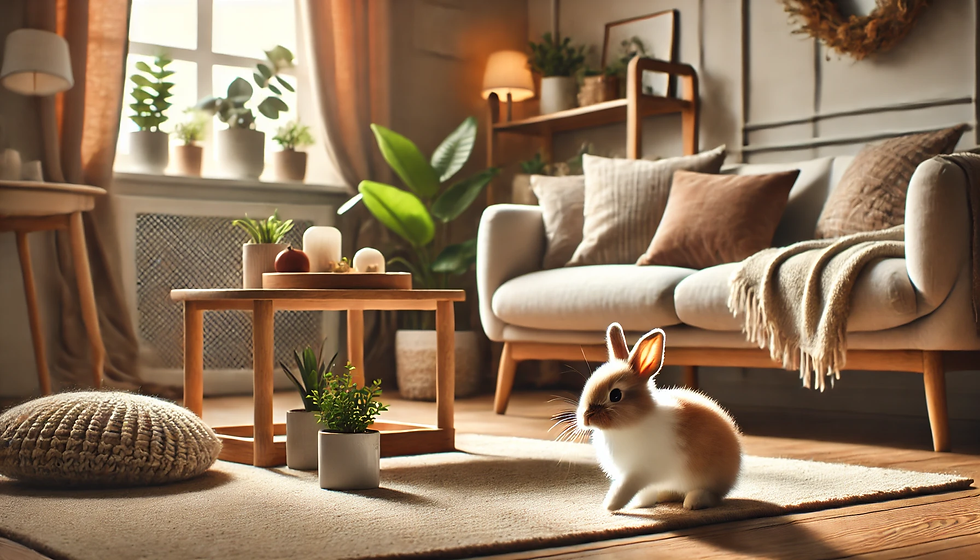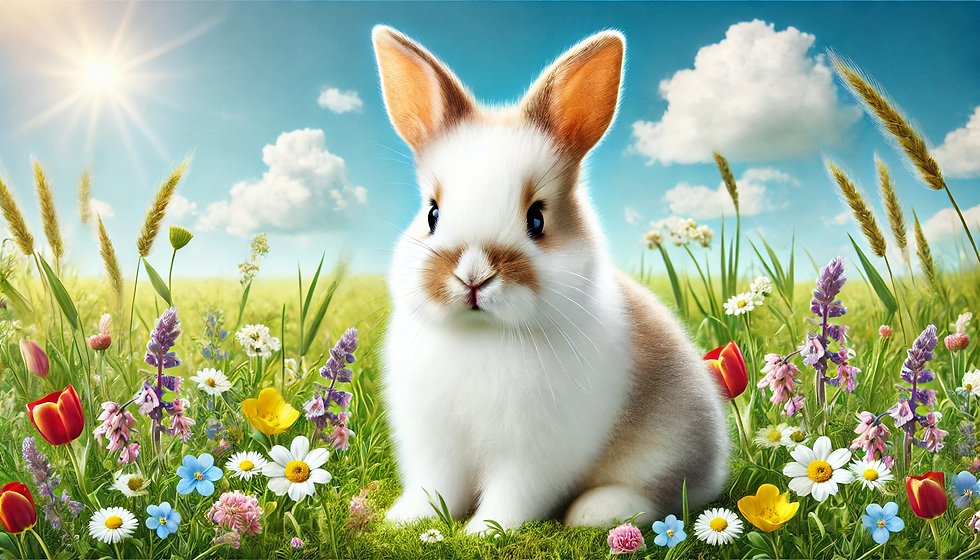Essential Rabbit Care Tips for a Happy and Healthy Pet
- Berk Kabaağaçlı
- 19 Oca
- 4 dakikada okunur
Rabbits are adorable, friendly, and intelligent pets, but they require proper care and attention to live a long, healthy, and happy life. Whether you are a first-time rabbit owner or an experienced pet parent, following these essential rabbit care tips can help you provide the best environment for your furry companion. From diet and grooming to housing and exercise, this guide covers everything you need to know to ensure your rabbit thrives.

1. Provide a Balanced Diet
A rabbit's diet is one of the most important aspects of its care. Rabbits are herbivores and require a diet that includes high-quality hay, fresh vegetables, and a small amount of pellets.
Hay: Hay should be the main component of your rabbit’s diet. It provides essential fiber for digestion and helps keep their teeth healthy. Offer unlimited amounts of hay such as timothy, meadow, or orchard hay. Avoid alfalfa hay for adult rabbits, as it is too high in calcium and can lead to kidney problems.
Fresh Vegetables: Incorporate fresh, leafy greens into your rabbit's diet. Some of the best options include kale, romaine lettuce, cilantro, parsley, and dandelion greens. Avoid iceberg lettuce as it lacks nutrients and can upset your rabbit's stomach.
Pellets: While hay and vegetables should form the bulk of your rabbit's diet, a small portion of high-quality rabbit pellets can provide additional nutrients. Be sure to choose pellets that are high in fiber and low in protein.
Fresh Water: Always provide fresh, clean water for your rabbit. A water bottle with a sipper tube or a bowl can be used, but ensure it’s changed daily to keep it clean.
2. Create a Safe and Comfortable Living Space
A proper living environment is key to keeping your rabbit healthy and content. Rabbits need a spacious, safe area to explore and relax.
Rabbit Cage or Pen: Ensure your rabbit has a large, secure cage or pen where they can move around freely. A minimum space of 12 square feet is recommended for a single rabbit. The cage should be placed in a quiet, low-traffic area of your home where your rabbit feels safe.
Litter Box: Rabbits are naturally clean and can be litter trained. Place a litter box inside their living area with paper-based or aspen bedding. Avoid using clumping cat litter, as it can be harmful if ingested. Clean the litter box regularly to maintain a hygienic living space.
Free Roaming Area: In addition to their cage, create a safe, bunny-proofed area where your rabbit can hop around. Make sure to secure electrical cords, wires, and other potential hazards that your rabbit might chew on.
3. Exercise and Mental Stimulation
Rabbits are highly active and social animals, and they require daily exercise and mental stimulation to stay healthy and happy.
Exercise Time: Allow your rabbit time outside their cage to hop, run, and explore. They need at least 3 to 4 hours of exercise every day, preferably in a rabbit-proofed room or an outdoor, enclosed space.
Toys and Enrichment: Provide various toys and activities to keep your rabbit engaged. Chew toys, tunnels, and cardboard boxes can help satisfy their natural instincts. You can also hide their food in toys or puzzle feeders to encourage problem-solving and mental stimulation.
Socialization: Rabbits are social animals and enjoy spending time with their human companions or other rabbits. Spend quality time petting, talking to, and interacting with your rabbit to build a strong bond.
4. Grooming and Hygiene
Regular grooming is essential for keeping your rabbit's fur healthy and free from mats. Depending on the breed, your rabbit may require more frequent grooming.
Brushing: Long-haired rabbits, such as Angora breeds, require regular brushing to prevent mats and tangles. Even short-haired rabbits benefit from a weekly brushing to remove loose fur and reduce shedding.
Nail Trimming: Regular nail trimming is important for your rabbit's health. Overgrown nails can cause discomfort and lead to foot problems. Use a small pair of pet nail clippers to trim the tips of your rabbit’s nails, being careful not to cut into the quick.
Ear and Teeth Care: Check your rabbit’s ears for any signs of infection, such as redness, discharge, or odor. You should also monitor their teeth for signs of overgrowth, which is common in rabbits. Providing hay helps naturally wear down their teeth, but if you notice any issues, consult a vet.
5. Regular Veterinary Care
Routine veterinary care is crucial for your rabbit’s long-term health. Rabbits require annual checkups to monitor their overall well-being and prevent potential health problems.
Vaccinations: Depending on where you live, your rabbit may need vaccinations against diseases such as rabbit hemorrhagic disease (RHD) and myxomatosis. Consult your vet about the appropriate vaccinations for your rabbit.
Spaying/Neutering: It is recommended to spay or neuter your rabbit, as this can prevent certain health issues and undesirable behaviors, such as territorial marking and aggression. Spaying or neutering also reduces the risk of uterine cancer in females.
Monitor Health: Keep an eye out for signs of illness, such as loss of appetite, lethargy, diarrhea, or changes in behavior. If your rabbit shows any of these symptoms, seek veterinary care promptly.
6. Rabbit-Proofing Your Home
As natural chewers, rabbits may chew on furniture, wires, or anything they can find. Rabbit-proofing your home can prevent accidents and ensure your rabbit’s safety.
Cover Wires: Use cord protectors or tape to cover electrical cords and wires that may tempt your rabbit to chew.
Secure Furniture: Ensure that any delicate or dangerous items are out of your rabbit’s reach. This includes plants, small objects, and anything that could pose a choking hazard.
Safe Spaces: Provide designated areas where your rabbit can freely roam without getting into trouble. Baby gates can help block off areas you don't want your rabbit to access.

Conclusion
By following these essential rabbit care tips, you can provide a loving, healthy, and safe environment for your furry companion. A well-balanced diet, proper housing, regular grooming, and plenty of exercise and socialization are key to keeping your rabbit happy and thriving. Remember that rabbits are gentle, intelligent creatures that require commitment and attention, so take the time to learn and care for your bunny as they deserve.



Yorumlar